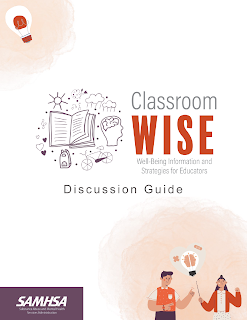Home > The ATTC/NIATx Service Improvement Blog > NIATx Model Featured in Newly Released Classroom WISE Training Discussion Guide
By: Kristina Spannbauer, Great Lakes ATTC, MHTTC, and PTTC Communications Specialist
The Great Lakes Mental Health Technology Transfer Center School-based Supplement (SB-MHTTC) recently published a companion discussion guide for the Classroom WISE training program. Classroom WISE is a free, self-paced online course for educators and school staff that focuses on increasing mental health literacy in schools and developing robust and sustainable supports for students experiencing mental health distress and adversity. The Classroom WISE Discussion Guide is a supplemental training resource based on NIATx principles. The guide offers users a framework for integrating the Classroom WISE strategies in schools by applying evidence-based process improvement methods such as the nominal group technique (NGT) and PDSA (Plan, Do, Study, Act) rapid-cycle testing.
 |
Recently, the Great Lakes SB-MHTTC also utilized the NIATx model as part of a school-based intensive technical assistance program (ITA) aimed at improving youth suicide prevention efforts. The educators who participated in the ITA reported how valuable NIATx was to the success of their initiatives. This positive feedback was, in part, the inspiration for creating the Classroom WISE Discussion Guide. The Great Lakes SB-MHTTC team recognized a unique opportunity to pair the NIATx model with the Classroom WISE curriculum to enhance the outcomes of the Classroom WISE strategies for educators and their students.
The NIATx model relies on implementation science and uses evidence-based practices to assist organizations through times of change in a collaborative manner that supports the organization’s goals and strengthens its infrastructure throughout the process. Furthermore, NIATx offers guidance on creating and facilitating work groups using nominal group technique—an approach emphasizing the equal representation of ideas, prioritizing organizational needs, and using data-driven decision-making to effect positive change. The inclusivity and equitable participation promoted by the nominal group technique is a vital component of successful process improvement as it explicitly includes the thoughts and opinions of everyone in the group—from the “executive” or those in leadership to the on-the-ground workers.
The Classroom WISE Discussion Guide is available for download on the Great Lakes Mental Health Technology Transfer Center’s products and resources website.
The Classroom WISE training program was developed by the Mental Health Technology Transfer Center (MHTTC) Network and the National Center for School Mental Health (NCSMH) with funding from cooperative agreements with the Substance Abuse and Mental Health Services Administration (SAMHSA).
For more information about Classroom WISE, and to access the brand new Cultural Inclusiveness and Equity (CIE) WISE companion training series, please visit classroomwise.org.
Check out the June 2022 ATTC/NIATX Service Improvement Blog, “SUD and Beyond: Schools Use NIATx To Improve Youth Suicide Prevention Efforts” to read more about applying the NIATx model to school-based programs and services.
The opinions expressed herein are the views of the authors and do not reflect the official position of the Department of Health and Human Services (DHHS), SAMHSA, CSAT or the ATTC Network. No official support or endorsement of DHHS, SAMHSA, or CSAT for the opinions of authors presented in this e-publication is intended or should be inferred.